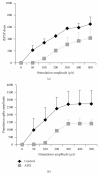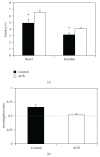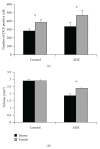A novel animal model of hippocampal cognitive deficits, slow neurodegeneration, and neuroregeneration
- PMID: 21541187
- PMCID: PMC3085481
- DOI: 10.1155/2011/527201
A novel animal model of hippocampal cognitive deficits, slow neurodegeneration, and neuroregeneration
Abstract
Long-term adrenalectomy (ADX) results in an extensive and specific loss of dentate gyrus granule cells in the hippocampus of adult rats. This loss of granule cells extends over a period of weeks to months and ultimately results in cognitive deficits revealed in a number of tasks that depend on intact hippocampal function. The gradual nature of ADX-induced cell death and the ensuing deficits in cognition resemble in some important respects a variety of pathological conditions in humans. Here, we characterize behavioural and cellular processes, including adult neurogenesis, in the rat ADX model. We also provide experimental evidence for a neurogenic treatment strategy by which the lost hippocampal cells may be replaced, with the goal of functional recovery in mind.
Figures







References
-
- Götz J, Ittner LM. Animal models of Alzheimer’s disease and frontotemporal dementia. Nature Reviews Neuroscience. 2008;9(7):532–544. - PubMed
-
- Smith ME. Bilateral hippocampal volume reduction in adults with post-traumatic stress disorder: a meta-analysis of structural MRI studies. Hippocampus. 2005;15(6):798–807. - PubMed
-
- Theodore WH, Bhatia S, Hatta J, et al. Hippocampal atrophy, epilepsy duration, and febrile seizures in patients with partial seizures. Neurology. 1999;52(1):132–136. - PubMed
-
- DeVries AC, Nelson RJ, Traystman RJ, Hurn PD. Cognitive and behavioral assessment in experimental stroke research: will it prove useful? Neuroscience and Biobehavioral Reviews. 2001;25(4):325–342. - PubMed
Publication types
MeSH terms
Grants and funding
LinkOut - more resources
Full Text Sources

